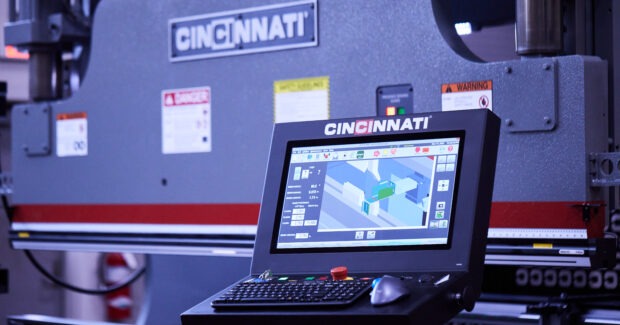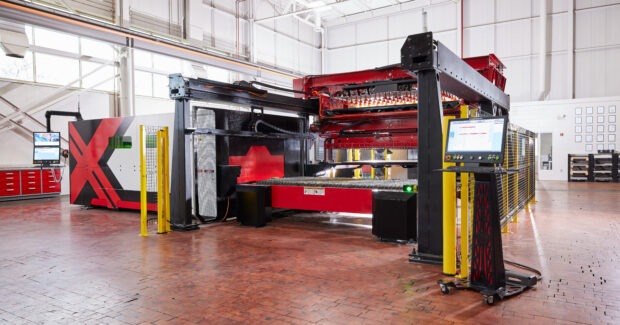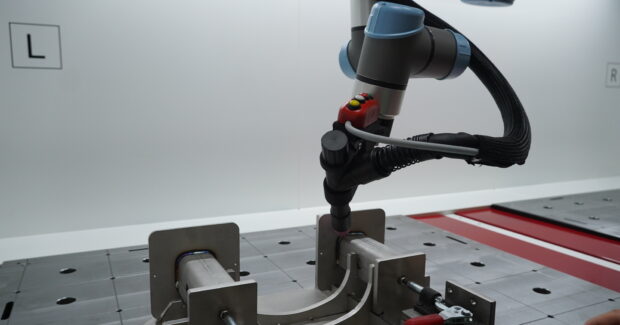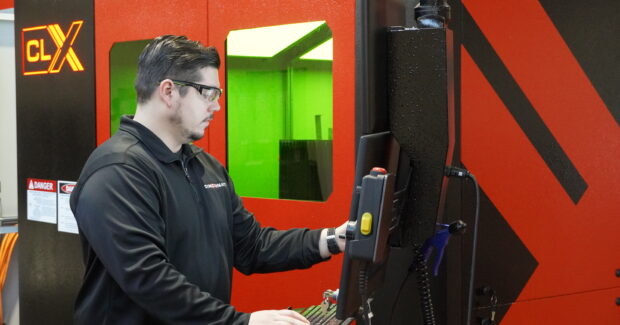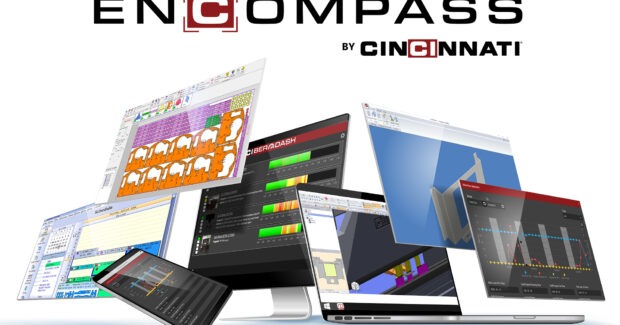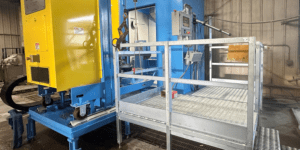CINCINNATI INC.: Designed for Operators, Built for Owners
Cincinnati partners with fabricators to examine where they are today and where they want to be in the future, building road maps and pathways to integrate technology and automation into their operations when it makes the most sense.
Posted: April 29, 2024

One of the major challenges in the metal fabrication industry is attracting employees with the skills required to run million dollar pieces of equipment. One solution is to manufacture the machinery so that it continually “learns” more about their own operations. Building in more intelligence eliminates guesswork from operators, who are more than likely not versed in all the fundamentals of fiber laser cutting or press brake forming, as examples.
“On the press brake side, how you bend metal fundamentally hasn’t changed in decades,” said Matt Garbarino, business unit leader for new machinery at CINCINNATI INC. (CI) (Harrison, OH). “But what has changed is how do we get to that formed part with a person that doesn’t have the skill set of understanding the fundamentals of forming? So that goes to what’s under the hood, right? What’s behind the scenes?”

The CI team is creating more intelligent and easier to use machines to ensure inexperienced operators succeed in the fabrication process. Engineers are developing even more user-friendly (think smart phones and tablets) human-machine interfaces (HMI) for the controls used on both their laser-cutting systems and press brake systems so that operators are comfortable with the machines. At the same time, shop owners will have confidence that operators are comfortable with the machine control interface and are able to effectively run the machines, even if they lack experience.
Garbarino said creating even more user-friendly machines where someone with no experience can successfully conduct laser cutting and bending processes is a great goal to have, but it’s a long road map to accomplish.
“There are two areas that we look at in our product roadmap,” Garbarino said. First, you have to build a dependable, quality machine. Interfaces and AI figure into CI’s road map, and “we’re taking those steps right now,” he said. “The next step for us is getting to that interface. It has buttons, graphics, and things that allow you to easily consume what you’re seeing and easy to interact.” Examples include prompts to check the status of nozzles, maintenance intervals and more — where the machine knows more about itself and its needs.

CI has highlighted iterations of their advances with interfaces at past FABTECH events, and the manufacturer will highlight additional advances at FABTECH 2024 in Orlando, Fla.
Precise Cutting and Bending Solutions
CI is a U.S.-based build-to-order machine tool manufacturing company that engineers and builds laser- cutting systems, automation systems, press brakes, shears, powdered metal presses and software. The company, located near Cincinnati, Ohio, has been operating in southwest Ohio for over 125 years.
The CI laser-cutting systems are available in a variety of wattages and sizes. Automation supports load/unload functions on the laser-cutting systems, and towers support the storage of parts, sheets, etc. CI’s software suite programs the lasers, schedules jobs for multiple lasers, and takes those orders from the enterprise resource planning (ERP) functions.

Garbarino noted that CI is increasing the speed and modularity of its laser-cutting automation systems. “This is a growth area for us — to offer customers flexibility,” Garbarino said. “So, if a customer starts with something basic, they can fast forward two years and add another laser to the system or a tower. It is that modularity piece.”
A highlight of CI’s laser-cutting machinery includes the CLX series. The machine is scalable and capable of full or semi-automation. At FABTECH 2023, visitors to the CINCINNATI booth saw the machine at work with a gas mixing device to support the processing of thicker metals.
An automation support system is the MARCH CORE, an automated load/unload system for stand alone or lights-out production. The system also supports fabrication operations that are not fully automated. With this system, operators can focus on higher-value tasks, spending less time handling and separating parts.

In addition to laser-cutting systems, CI offers press brakes spanning from small electric press brakes to large tonnage press brakes from 60’ wide to 2,000 tons. Press brake machinery is available in CNC hydraulic, electric and hybrid models.
One of CI’s new offerings is the EZ BEND cobot, which allows shops to enhance metal forming capabilities without added equipment or resources. The cobot makes automation more accessible for small to mid-size manufacturers, automating repetitive tasks so operators can focus on more complex tasks. Also, operators can run multiple press brake applications simultaneously. The EZ Bend cobot is built on a low-code platform so operators don’t need to be an engineer or master programmer to use the machine. EZ BEND, with a reach of 68.9,” is capable of lifting and moving parts weighing up to 44.1 lbs. The six rotating joints of the robotic arm provide a wide range of motion allowing for configuration in confined spaces.

CI also offers a cobot welding system called the EZ Weld, a TIG welder that automates production processes. “It’s a big concept where the loading system has a cobot arm to automatically do the welds and other activities,” Garbarino said. The CI Cobotic 100T Welding Cell is the industry’s first robotic cell for TIG welding.
When it comes to advances in user-friendly machinery, Garbarino added the CI team keeps ergonomic processes at the forefront when developing fabrication machinery. This is seen especially in regard to press brake machines where operators standing in front of a machine grab pieces of sheet metal and rotate it and perform other activities. “They [operators] are trying to look at the control and look at what it’s telling them to do graphically on how to rotate the parts,” Garbarino said.
With the ergonomics component, CI creates workspaces so operators operate the machinery in an environment similar to sitting at a physical desk. For example, the operators need to make better use of their space because they are working with multiple monitors, headsets, conducting video calls with engineers who are located elsewhere in the facility or offsite. They also need access to USB interfaces, hotspots, Ethernet connectivity and so on. “They [operators] need more real estate, too, on screens because they need to be able to see prints,” Garbarino said. “They need to be able to see their ERP systems with the part orders. They need to see the bend simulation software and more.”

Garbarino noted that CI will be highlighting at this year’s FABTECH new releases and features that allow customers to do more with software. The CI team is also excited about launching a different HMI control. “There’s other technology that we’re going to be adding based on voice to the customer — learning the needs of our customers — and adding that technology to our machines,” Garbarino noted.
Attentive and Responsive
Listening to and solving customers’ needs is seen with the larger 24” control screen (with the option of dual 24” monitors) on the XFORM Press Brake, which debuted at FABTECH 2023. XFORM’s new ergonomic pendant arm (Omni-Arm) and expanded console are especially significant.
With the dual 24” monitors, full screen bend simulation, optional rear and front camera view, Wi-Fi/Bluetooth compatibility, and more, the machine’s HMI creates an efficient and interactive workstation.

The enhanced control screen and other features in part resulted based on a tour of a fabrication shop. The press brake operator was using headphones and webcams to conduct video calls with engineers located in another area of the plant and/or offsite. “Sometimes there were questions about the part being formed,” Garbarino said. “The customer would conduct a Microsoft Teams meeting and conduct an interactive conversation with that designer.” The customer had bolted on these technologies and was rotating the screen with an attached webcam to show the engineers the challenging application.
This improvised process wasn’t integrated into the control system. After visiting with its customers, CI learned that other shops would be interested in having functionalities built into their controls, which was implemented in the XFORM Press Brake.

The need for access to wider and multiple monitors to view blueprints and other items was behind the dual monitors. Garbarino said customers were posting their prints with magnets to the ram and using computer carts to see functions such as their ERP systems. With the introduction of an ergonomic pendant arm called Omni-Arm, the dual monitor HMI can be positioned virtually anywhere.
“It sounds simple; dual monitors a flexible arm,” Garbarino said. “But what went into it was a robust, durable, and flexible pendant arm that could be easily positioned. Additionally, we had to allow the customer to install their ERP software, CAD viewers, and related software on the control. Lastly, if they’re going to interact with it, they have to see it —they can’t stand 10 feet away. There has to be a way to maneuver that interface close to them when they need it. And then push it out of the way when they don’t need it.”

CI partners with its customers taking a consulting role and employing a direct sales force in order to ascertain where a shop stands today and based on that data, building a road map of where the customer wants to go in two years and/or five years, and put a path together for technology, such as automation. Garbarino said CI follows building blocks to ensure that a customer’s journey into automation is successful. Oftentimes the integration can fail because a company goes from zero to 100 without scaling up the addition of more machinery.
“One of the things we take a lot of pride in at CINCINNATI, that’s unique to anybody else out there, is that our equipment is upgradable,” Garbarino said. Say a customer bought a press brake in 1980 and it is still running, it still bends parts. But what is outdated is the control. “We have the ability to upgrade to that new control,” he said. “For example, this new HMI that we’re going to release at FABTECH. That is going to be retroactively upgradable to machines. Naturally, there is a cutoff point.”

Customers have the ability, for a fraction of the cost, to benefit from the updated control technology on a machine they invested in decades ago. This approach allows fabricators to open up their labor force because operators who aren’t as knowledgeable as the operator who has been running the machine for the past 30 years and who knows everything about sheet metal, are able to run the older machines with confidence. “It puts some parity into your shop to allow people to run older machines with new technology,” Garbarino said. “It is all about productivity. It is all about streamlining processes. It is about reducing labor.”
CINCINNATI INC.: Committed Veteran-friendly Employer
CINCINNATI INC.’s (CI) slogan: “American Owned, American Made” is a source of pride for the company’s employees, said Matt Garbarino, business unit leader for new machinery at CI. That foundation creates an attractive place to work for employees, including the nation’s veteran population. “Nearly 25% of our workforce is comprised of veterans,” Garbarino said.
 The company partners with both local and national organizations, including the Folds of Honor Foundation (www.foldsofhonor.org), which will be part of CI’s presence at FABTECH 2024. Folds of Honor raises scholarship money for the children and spouses of fallen or disabled military and the nation’s first responders.
The company partners with both local and national organizations, including the Folds of Honor Foundation (www.foldsofhonor.org), which will be part of CI’s presence at FABTECH 2024. Folds of Honor raises scholarship money for the children and spouses of fallen or disabled military and the nation’s first responders.
CI has also been recognized for employing veterans, and in 2024, CI earned the designation as a VETS Indexes 4-Star Employer. The award recognizes the company’s commitment to recruiting, hiring, retaining, developing, and supporting veterans and the military-connected community.





